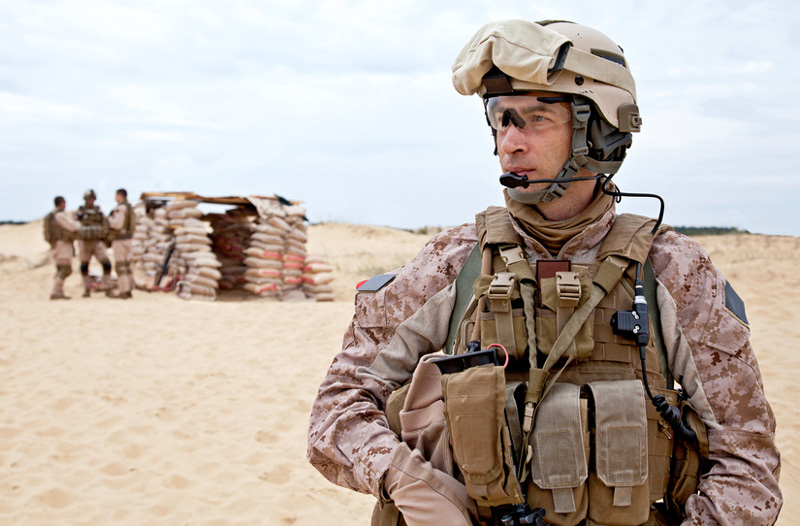The U.S. Department of Veteran Affairs (2014) reported that approximately 20% of service members who served in Iraq or Afghanistan developed combat-related PTSD. Mental health issues following combat tours are not exclusive to service members. de Burgh et al. (2011) stated that spouses of service members affected by combat-related PTSD display symptoms of anxiety, sadness, anger, displacement, and dissatisfaction in the relationship. Ahmadi et al. (2011) and de Burgh et al. (2011) referred to these symptoms as secondary traumatic stress (STS). Symptoms of STS are like PTSD symptoms; however, they develop due to a relationship with a traumatized individual, rather than experiencing a traumatic event (Ahmad et al., 2011).

While combat-related PTSD among service members have been studied extensively, studies exploring STS and general psychological stress among military spouses are sparse (Bjornestad, Schweinle, and Elhai, 2014; Nelson-Goff et al., 2016). We need to recognize that military spouses can be negatively affected by their partner’s PTSD symptoms. Hence, researchers are encouraged to focus on military spouses’ daily challenges living with someone diagnosed with PTSD. Additionally, it is important to include military spouses during mental health assessments, since PTSD effects the entire family. Currently, mental health providers do not consider military spouses during the PTSD treatment process.The aim of this article is to raise awareness of military spouses’ experiences, pinpointing common themes, and advocating for access to mental health resources, which currently is almost non-existent. Data were collected through in-person semi-structured interviews with 15 spouses (12 wives, 3 husbands) of service members who served in either Iraq or Afghanistan. I identified five common themes from the interviews which I summarize next.
Lack of Intimacy
All 15 spouses reported a lack of intimacy with their military partner after their return from a combat tour. The most common behaviors were reduced cuddling, hugging, holding hands, and significantly reduced communication regarding the relationship. The wives reported they thought the change was their fault. All the spouses noted they felt like they were walking on eggshells, never knowing what would set their military spouses off. All spouses reported they were a “nervous wreck, everything I did was wrong. I never knew the correct thing to do.” One husband said when his wife (service member) left on an 18-month tour, they had a one-year-old. Since he was the primary caregiver for those 18 months, it was a difficult adjustment when his wife returned. His wife admitted she did not feel as strong of a connection with their daughter and would get angry at the close dad-daughter relationship.
Anxiety, Depression, and Anger
Of the 15 spouses, nine reported feelings of depression and six reported feelings of anxiety due to “having to watch over spouse constantly.” One husband stated, “My (military spouse) was like Jekyll and Hyde; one day happy and the next crying or mad. Then she would not want to talk, I felt so helpless! It took a toll on me since I did not know what to expect.” Seven wives reported they ceased talking about politics and felt they had to watch over their military spouses when they engaged with friends in case an argument ensued. All 12 wives reported feeling scared and anxious when their husbands started getting angry. One wife said she was on edge all the time. “The anger comes out of nowhere and with the smallest thing.” Another wife said, “He would get angry over the smallest things.” Five spouses reported their military spouses began playing first-person shooter computer games. All spouses attended military sponsored seminars on what to expect when service members return. However, they all agreed the seminars did not prepare them for the psychological toll. Majority of spouses said, “I felt all these behaviors were because of me. I just wanted my old life back. I just wanted my old relationship back. I wanted my spouse back.”
Caregiver Burden
All interviewees reported difficulty coping with their military spouses’ isolation, and its effects on them. The interviewees reported that since their spouses refused to spend time outside of the house with friends and family, they too isolated from friends and family. “I would make up excuses to not meet up with friends, I was nervous to leave (military spouse) home alone.” One spouse reported, “My (military spouse) isolated in the bedroom for hours sleeping or reading a book. I did not know if I should join or leave him be. I would lay down, and he would ask what I wanted. It was nervous and confusing!” All three husbands mentioned anxiety about leaving their military spouses at home; they worried about their military spouse and had difficulty concentrating at work. One husband went so far as to ask his mother to spend time at the house since he was anxious about leaving his military wife alone with their two-year old. The spouses reported difficulty in navigating the VA system for medical visits and the complicated process of securing a PTSD diagnosis for their military spouse. “God forbid my husband needed urgent care, I can’t make an appointment with the VA online or over the phone. I must leave a message and the clinic will call back—that is if they ever call me back—to set up an appointment.”
Secondary Traumatic Stress
All spouses reported hypervigilance and isolation in response to their military spouses’ behaviors. All spouses reported trouble sleeping since their military spouses were continually waking up at night. One spouse mentioned being careful not to argue with her husband at nighttime since he would become enraged and go for long walks in the middle of the night. All spouses reported being hypervigilant when it came to fireworks. “The sound of fireworks always takes my husband back to Iraq.” Out of the 15 spouses, 13 mentioned unease about going into public with their military spouses, the unknown about how their partner would react to people, to logos on t-shirts, to posted political signs, to looks from strangers.
Isolation
All spouses reported feeling alone and not supported. Although all spouses mentioned they could go to counseling groups for military spouses, it was not the same type of intensive support as mental health counseling their military spouses were entitled to. All spouses reported feeling misunderstood and not supported. Although none of the interviewees reported lack of support from family and friends, they all reported limited support from the military and had limited (if any) resources for mental health services. Most of the spouses talked about a military culture—you married into the military, you fix the problems, and support your military spouse. “There is a stigma to seeking out help for mental health issues.”
Military spouses carry a burden few understand; many do not recognize the increasing mental health issues that accompany being a military spouse. However, their support is vital in a service-member’s successful reintegration after a deployment. Spouses I interviewed reported lack of support preparing them for the psychological stress living with a service member with PTSD and lack of support in coping with the stressors. It is imperative researchers conduct research in this area to promote change in the perception that military spouses are immune and don’t need mental health services. Military spouses are the backbone of service members. As one wife said, “Family and friends are so glad my [military] husband has me for support. But who supports me when I need it?”
Heidi Hillman Ph.D., BCBA-D, LMHC, is Associate Professor at Eastern Washington University. You can contact Heidi Hillman at hhillman@ewu.edu
References
Ahmadi, K., Azampoor-Afshar, S., Karami, G., & Mokhtari, A. (2011). The association of veterans’ PTSD with secondary trauma stress among veterans’ spouses. Journal of Aggression, Maltreatment & Trauma, 20(6), 636-644.
Bjornestad, A. G., Schweinle, A., & Elhai, J. D. (2014). Measuring secondary traumatic stress symptoms in military spouses with the posttraumatic stress disorder checklist military version. The Journal of Nervous and Mental Disease, 202(12), 864-869.
de Burgh, H. T., White, C. J., Fear, N. T., & Iversen, A. C. (2011). The impact of deployment to Iraq or Afghanistan on partners and wives of military personnel. International Review of Psychiatry, 23(2), 192-200.
Nelson Goff, B. S., Hartman, K., Perkins, D., Summers, K., Walker, L., & Monk, J. K. (2016). Talk to me: Disclosure of trauma experiences to spouses in a sample of military couples. Journal of Veterans Studies, 1, 98–128.
U.S Department of Veterans Affairs (2014). PTSD: National Center for PTSD. Retrieved from http://www.ptsd.va.gov/public/PTSD-overview/reintegration/overview-mental-health-effects.asp





It’s wild how the spouse is celebrated for being so supportive to their service member post-deployment, yet no one truly checks in with the spouse who is walking on eggshells trying to navigate this new world.
And these issues will last on and off for years to come. I wasn’t with my husband while he was in the military. I met him 6 years post service. And I’ve been with him 6 years. He’s gotten better with help but still has time periods where he struggles. It’s definitely taken a toll on me and our marriage.
I married a Special Forces guy about 10 years after he got out of the Army. He still deals with sleep issues, nightmares, and anger issues. Counseling has helped some, but I don’t recall a week in the last 9 years when he wasn’t mad at either me or one of the kids for 1-2 days. It is hard. And he is a great man, putting in a lot of work for himself and the family. I wish there was more help and less stress out there.
Many many years ago while attending a NJROTC program at our son’s school. When the mock gun salute took place my husband slammed me to the ground and covered me with his body. It was his hypervigilent reaction to the sounds of gunfire to protect me. As he’s aged it has increased tremendously